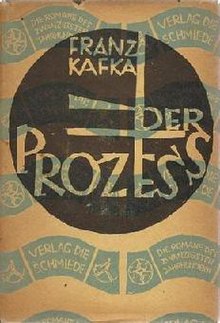Great Books/Reading The Trial

The Trial by Franz Kafka is a surreal and haunting novel that follows the protagonist, Josef K., as he is unexpectedly arrested and subjected to a bewildering and labyrinthine legal process.[1] The novel opens with the protagonist, Josef K., being arrested by unidentified agents in his apartment one morning, without being informed of the charges against him. From that moment on, Josef K. finds himself embroiled in a nightmarish world of bureaucratic absurdity and existential uncertainty.
As Josef K. attempts to navigate the legal system, he encounters a series of enigmatic characters, including court officials, lawyers, and judges, all of whom seem to be part of an inscrutable and all-powerful institution known only as "the Court." Despite his efforts to assert his innocence and understand the nature of his crime, Josef K. is met with indifference, obstruction, and incomprehensible rules and procedures.
Throughout the novel, Josef K. becomes increasingly entangled in a web of paranoia, suspicion, and anxiety as he grapples with the Kafkaesque complexities of his trial. He forms relationships with various women who offer him support or distraction, including Fräulein Bürstner, Leni, and the court painter's wife.
As Josef K.'s trial progresses, he experiences moments of hope and defiance, but ultimately, he is unable to escape the inexorable machinery of the Court. The novel culminates in a climactic and ambiguous ending, in which Josef K. is led to an abandoned quarry and executed by two enigmatic agents of the Court.
The Trial is a masterful exploration of themes such as the nature of authority, the absurdity of bureaucracy, the search for meaning in an indifferent world, and the existential angst of modern life. Kafka's prose is characterized by its surreal atmosphere, intricate symbolism, and profound psychological insight, making The Trial a timeless and deeply unsettling work of literature.
Assignment
[edit | edit source]Obtain a copy of the book. It is pending inclusion in Wikisource, and is available from several libraries listed in Worldcat.
Read the book. Study the book.
Write an essay on one of the following topics:
The Trial by Franz Kafka is a thought-provoking novel that delves into themes of justice, power, bureaucracy, and existentialism.[2] In a Great Books University curriculum, discussion questions for "The Trial" might encompass various aspects of the novel's narrative, characters, and philosophical implications. Here are some typical discussion questions that could be assigned for The Trial:
- Existential Themes: How does "The Trial" explore existential themes such as alienation, absurdity, and the search for meaning? What existential questions does the protagonist, Joseph K., grapple with throughout the novel?
- The Nature of Authority: Discuss the portrayal of authority figures, such as the Court and its agents, in "The Trial." How do they wield power over the individual, and what does Kafka seem to suggest about the nature of authority and control?
- Bureaucracy and Dehumanization: How does Kafka depict bureaucracy in "The Trial," and what effect does it have on the characters and society as a whole? How does the bureaucratic process contribute to the dehumanization of individuals like Joseph K.?
- The Absurdity of the Legal System: Explore the absurdity of the legal proceedings in "The Trial." How does Kafka use surreal and illogical elements to critique the legal system and its mechanisms of justice?
- Guilt and Innocence: Analyze the themes of guilt and innocence in "The Trial." How does Kafka blur the lines between guilt and innocence, and to what extent is Joseph K. complicit in his own downfall?
- Symbolism and Allegory: Identify and discuss the symbolism and allegorical elements in "The Trial," such as the Court, the Law, and the process of trial itself. What deeper meanings might these symbols represent?
- The Role of Women: Consider the portrayal of female characters in "The Trial," such as Fräulein Bürstner and Leni. What roles do they play in Joseph K.'s life, and how do they contribute to the novel's themes and narrative?
- Fate vs. Free Will: Explore the theme of fate versus free will in "The Trial." To what extent is Joseph K. responsible for his own actions and their consequences, and how much agency does he truly possess in the face of external forces?
- Interpretations of the Ending: Discuss the ambiguous and open-ended nature of the novel's ending. What are some possible interpretations of the final chapters, and what do they suggest about Joseph K.'s ultimate fate and the meaning of his trial?
- Relevance to Contemporary Society: Consider the relevance of "The Trial" to contemporary society and modern-day issues such as surveillance, bureaucracy, and the erosion of individual rights. How might Kafka's critiques of power and control resonate with contemporary readers?
These discussion questions encourage students to engage critically with the text, explore its thematic richness, and draw connections to broader philosophical and social contexts.
